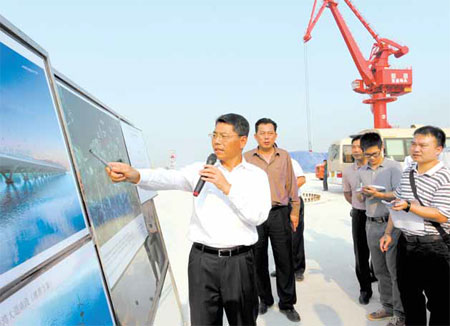Balance for environment, economy
|
Zhanjiang Mayor Wang Zhongbing and other city government officials examine the blueprint for the west bank of the Zhanjiang Bay. Zhou Haitao / for China Daily |
Massive development plans, eco-awareness in Guangdong
A city needs a soul to be great. For port city Zhanjiang on China's southern coast, that soul comes from being "HAPPI".
Coined by Mayor Wang Zhongbing, "HAPPI" is an acronym for harbor, amazing, petrochemical, papermaking and iron-steel. It describes the city's major industries and pleasant environment.
"Zhanjiang is in the middle of rapid industrialization, but the process has adopted a new approach and will make the city an even more beautiful place," said Wang.
"For the industrialization to be deemed successful, people here have to be happy with its outcome."
Zhanjiang lies on an inlet on the South China Sea at the southwestern end of Guangdong province and faces the island of Hainan to the south.
It has an airport with direct flights to Hong Kong and Beijing, and railways and highways linking it closely with Southwest China along with the rest of Guangdong and the country.
The main city in the less-developed western part of Guangdong, Zhanjiang is expected to be the new engine for the development in the province, which is investing heavily in the city and its surroundings.
Guangdong is traditionally No 1 on China's GDP list, but the eastern province Jiangsu is narrowing the margin.
Approved by the central government, the new Guangdong International Airport will be built in Zhanjiang. Construction will begin in 2015 and is expected to be completed by 2017. The airport will have the same status as airports in Guangzhou and Shenzhen and will be a hub for southwestern China.
A high-speed railway being built will shorten travel time between Guangzhou and Zhanjiang to about two hours when operational in 2016. Now it takes a five-hour drive.
A new highway under construction starts and also ends in Zhanjiang. It will circle along the coast of the Leizhou Peninsula where the city is located.
Guangdong is betting on Zhanjiang because the city has many advantages including a natural deep-water harbor.
The harbor opened in 1956 with throughput of 1 million tons in the year. Its throughput has already reached 180 million tons in 2013 and there is still great potential for more, said the mayor.
"Now that Zhanjiang has been selected to become the main port in the south, we feel great urgency. The harbor is to go beyond the Bay of Zhanjiang where it lies at present," he said.
"There are many places on the Leizhou Peninsula that have the natural conditions to build harbors. There are five counties on the coast that have only fishing ports. We want to build an industrial port in each county.
"One industrial port, one fishing port and one scenic town that lie beside each other are enough to gear up the growth of a county, as it has been in many places in Europe."
Besides the port, nature has endowed Zhanjiang with China's longest beach as well as quite a few others. It also has one of the world's largest volcano lakes, and a great variety of seafood and tropical plants.
Also amazing is the fresh air. While many Chinese cities are battling air pollutants the PM2.5 - airborne particles smaller than 2.5 microns - readings stay below 20 in Zhanjiang all year round.
The petrochemical joint venture between Sinopec and Kuwait Petroleum Corp under construction is designed to process 15 million tons of crude oil and produce 1 million tons of ethylene annually. The crude oil project will go online in 2016, followed by ethylene production in 2017.
The first phase of the 7.6 billon yuan ($1.2 billion) paper plant by Guangdong Guanhao High-Tech Co went into trial operation this month. China Paper Corp and Chenming Group also have massive projects in Zhanjiang.
State-owned conglomerate Baosteel Group is building a modern iron-steel complex, the first phase of which will be completed as early as Sept 2015. It will turn out 9.2 million tons of iron and 10 million tons of steel annually, replacing old, polluting iron and steel-making capacity that the country is eager to shed.
The petrochemical and iron-steel projects will form a circular economy by using each other's byproducts, and use the most stringent environmental standards.
"We are working very closely with investors and managers of these heavy industry projects," said Mayor Wang.
"We want to build a city that is beautiful and rich in the following centuries with future residents that are happy with the delicious seafood, the fresh air and the white beaches. 'HAPPI' is for the present, and also for the future," he said.
wangshanshan@chinadaily.com.cn

























